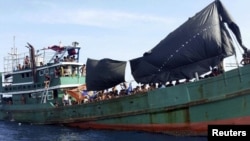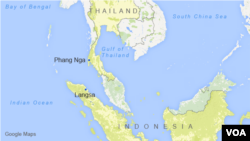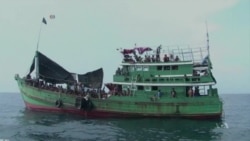Southeast Asian leaders fretted Friday about the surge of thousands of maritime migrants landing on their shores and thousands more en route, while U.N. officials resorted to blunt language to prod the governments to respond humanely.
"If many more of them come, it will cause a problem," proclaimed Prime Minister Prayuth Chan-ocha in Bangkok, who heads Thailand's ruling military junta. "They will steal the jobs and livelihoods of Thais."
A top Malaysian official said the impoverished boat people were not welcome, but the country's prime minister Najib Razak — in a more tempered statement — declared himself "very concerned with the plight of migrants in our region" and pledged "necessary actions to deal with this humanitarian crisis." His four sentence statement mentioned no details.
Indonesia on Friday said it had turned away two boats.
Nearly 800 migrants from Myanmar and Bangladesh were rescued Friday after their boat sank off the eastern coast of Indonesia's Aceh province, officials said.
A police official at the port of Langsa described the Rohingya as desperately attempting to escape their overcrowded boat "killing each other, throwing people overboard."
Local fishermen spotted the sinking boat and brought the migrants to shore where they have been placed in a warehouse temporarily, according to authorities in the port of Langsa.
One other landing with nearly 100 migrants who had been at sea for nearly three-and-a-half months occurred on Sumatra in western Indonesia Friday.
On the Thai island of Surin, 106 people came ashore Thursday night and were taken to Phang Nga where they are to receive assistance from the International Organization for Migration, which is releasing $1 million to help governments in the region give food, water and medicine to those found.
“I am appalled at reports that Thailand, Indonesia and Malaysia have been pushing boats full of vulnerable migrants back out to sea, which will inevitably lead to many avoidable deaths," said U.N. High Commissioner for Human Rights Zeid Ra’ad Al Hussein. "The focus should be on saving lives, not further endangering them."
"We did not push them back but gave them food and water, adhering to humanitarian obligations," Capt. Thammawat Malaisukarin, civil affairs director of the Royal Thai Navy's third area command told VOA. "They did not want to come ashore in Thailand but insisted to travel to a third country."
Those concerned with the plight of ethnic Rohingya, fleeing persecution in Myanmar, backed that account.
“I don't think they understand this big international context,” said Jeffrey Labovitz, Thailand chief of mission for the International Organization for Migration. “They know they want to get to Malaysia and with the supplies that were given and help to fix their engine they preferred to go to Malaysia, which they did.”
There are several hundred Rohingya, including women and children, aboard the vessel known as “Anwar's boat” after the smuggler who abandoned it. The vessel was back in Malaysian waters for a second time Friday before returning to Thai waters late in the evening.
Deadly travel
Those on board have said 10 people had died during the journey from Myanmar - also known as Burma - and the bodies had been dumped into the sea.
Any migrants landing on Thailand's shores will be prosecuted for illegal entry, said army Major General Sansern Kaewkamnerd, a spokesperson for the military junta.
"We have given the navy a clear policy that those who plan to land on the Thai coast are welcome to do so and we will give them humanitarian assistance," the general told reporters at a briefing on Thursday. "But we will treat them in accordance with our laws about illegal entry into the country."
Article 22 of the Convention on the Rights of the Child specifically requires governments to take measures to ensure that a child who is seeking refugee status receives appropriate protection and humanitarian assistance.
"These children need, and they have a right to, urgent help and protection," said UNICEF East Asia-Pacific Regional Director Daniel Toole.
U.N. Secretary-General Ban Ki-moon expressed alarm that “some countries may be refusing entry to boats carrying refugees and migrants,” adding he urges governments “to facilitate timely disembarkation and keep their borders and ports open in order the help the vulnerable people who are in need.”
The Arakan Project, an NGO concerned with the plight of the Rohingya, prior to Friday's landings said that 8,000 migrants might be on the seas in overcrowded boats.
The U.N.'s Human Rights office now estimates about 6,000 Rohingya and Bangladeshi migrants are still stranded at sea in Southeast Asia "in precarious conditions."
Shelter delay
Local media reports in Bangkok say the military-run government is considering erecting temporary shelters on islands to process migrants, but no decision will be made until after Thailand hosts a May 29 international conference to discuss the matter of the exodus.
“Certainly when we're looking at regional solutions, everyone in the region needs to come together and talk,” Labovitz said in a VOA interview. “I'm really happy Thailand has proposed this meeting” but it cannot help those “who are at sea today because it's too far away and we need to address those concerns more immediately.”
Watch video report from Zlatica Hoke:
Myanmar's participation in the Bangkok summit is crucial, but the office of the country's president indicated Friday Myanmar was "unlikely to attend" the meeting.
Myanmar's government says the regional migrant crisis should only be discussed in reference to "boat people," not "Rohingya."
"For us, it will not be helpful to discuss if it is [on the issue of] Rohingya. As both our government and the public do not accept that, it will not be helpful at all if we discuss that," Deputy Foreign Minister Thant Kyaw told VOA's Burmese Service Thursday.
Zeid, the UN human rights chief, in a statement Friday that “until the Myanmar government addresses the institutional discrimination against the Rohingya population, including equal access to citizenship, this precarious migration will continue."
Myanmar, a predominately Buddhist country, does not recognize the ethnic Muslim Rohingya as an entity, even though many families have lived in the country for generations. The government's general attitude is that the impoverished Rohingya who lack documentation are from Bangladesh and illegally in Myanmar.
Since sectarian unrest in mid-2012 tens of thousands of Rohingya have been forced into overcrowded camps in western Rakhine state.
Crackdown on smugglers
A primary catalyst for Asia's latest boat people crisis has been Thailand's crackdown this month on smugglers' camps, primarily located on rubber plantations in the jungles of the southern part of the kingdom after discoveries of mass graves.
With the Thai way stations closed and other countries vowing not to let migrant ships land on their shores, those seeking refuge find themselves caught in a game of maritime "ping pong" that humanitarian organizations worry might only end with boatloads of desiccated corpses adrift on the high seas.
Listen to VOA's Steve Herman interview IOM country director Jeffrey Labovitz in Thailand regarding the refugee/migrant situation in Southeast Asia:








